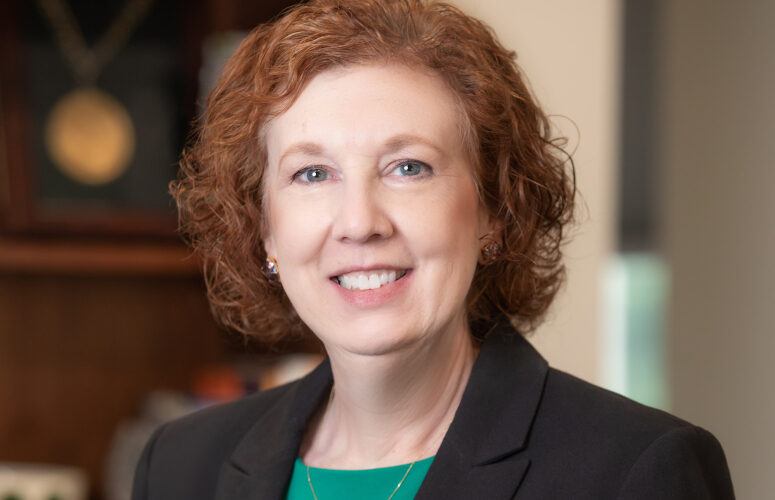
New MCCC President Discusses Her Vision for the Community College
By Anthony Birritteri, Editor-in-Chief On Aug 8, 2022Dr. Deborah Preston has been serving as the new president of Mercer County Community College (MCCC) for a little more than five weeks, yet her plans for the 56-year-old institution are many, and will only increase as she begins meeting and listening to the needs of the local community, as well as businesses throughout the region.
At the top of her “to do list” is finding ways to boost the college’s declining enrollment, an issue that many colleges and universities have been facing since the start of the COVID-19 pandemic, but has hit community colleges the hardest.
According to a study released early this summer by the National Student Clearinghouse Research Center (NSCR), while public four-year institutions in New Jersey suffered enrollment declines for the last spring semester, exceeding 4% from the prior year, the state’s community colleges were hit even harder. Enrollment at public two-year institutions declined 13.5% over this same time period – more than any other state. In fact, enrollment at Garden State public two-year institutions had fallen approximately 25% in the past two years.
At MCCC, the combined credit and non-credit student enrollment count is 9,508. According to Dr. Preston, credit student enrollment has decreased by 10% while non-credit enrollment has decreased by 15%.
“We need to figure out how to manage the (declining) enrollment. Everybody (higher education institutions) lost enrollment during the pandemic, and it’s not rebounding. Additionally, we are in a part of the country that is expecting a demographic drop off, so the things we have done in the past to generate enrollment are not going to work anymore,” she said.
Dr. Preston explains that the enrollment loss at two-year community colleges is greater than at four-year colleges and universities because the four-year institutions are adjusting their enrollment criteria and financial packages. “They are allowing in cohorts of students who previously would not have made the cut, and they are offering financial packages that often mimic what community colleges offer,” Dr. Preston said. “What bothers me is that they are letting in students who might not succeed, so we have to be ready to pick up the pieces, because the worst possible thing is for those students not finish college.”
“I hate for us to be in competition with (four-year institutions) because we should be serving students in a collaborative way, but right at this minute, with enrollment looking the way it is, we are competing for students,” she said.
At the same time, Dr. Preston is looking to interact more with the business community in the effort to develop academic programs that meet employer needs. “We should be collecting information from business and industry to find out where their employment gaps are. Then we look for matches; that is where we will develop our programs,” she explained.
She explained that while serving as provost and vice president of academic affairs at Raritan Valley Community College (RVCC), where she was collaboratively responsible for all units of the college, including academic affairs, workforce development, finance, facilities and human resources, the institution had great success working with Labcorp, for example, in developing a medical lab technology program and working with four area pharmaceutical firms for the development of a clean room training program.
With the vast array of life sciences firms located in Mercer County, Dr. Preston said the clean room technology program is something she is already looking into for MCCC.
She adds, “One thing I am very interested in is 3D bio-printing, in which a 3D printer prints human tissues or organs. Rutgers University is working on the technology. At some point there will need to be people who know how to operate that equipment and need to know enough about chemistry and biology so that you don’t kill cells in the process. I can’t get [that technology] out of my head. It’s coming and we could be out in front of it.
“We also have a fairly new advanced manufacturing program that should have more students than it does. I want to meet with the local industry to find out what the missing link is. The program should be full and companies should be snapping up these students,” she said.
Dr. Preston has already met with business leaders on the MCCC Foundation Board. Additionally, she plans to meet with various chambers of commerce, and said she is open to ideas and suggestions pertaining to cooperation and partnerships between businesses and the institution.
On the facility infrastructure side, Dr. Preston said that MCCC does have some money for capital improvements. This money comes from various sources, including the Securing Our Children’s Future Bond Act and the state’s Chapter 12 capital bond funding program. “I will also be asking our communities and foundations to help us with capital investments,” Dr. Preston said. “I think we all have a mutual interest, especially in Trenton, in getting more buildings and more programs up and running.
MCCC has a main campus in West Windsor and operates the James Kerney Campus (JKC) in Trenton, where Dr. Preston would like to see more improvements made. “Certain buildings on that campus are in need of major upgrades and at least half of one building needs to be torn down. There’s a lot of deferred maintenance … HVAC issues that need to be mitigated … and cosmetically, these buildings need a facelift. For students to come to a campus that is not in tip-top shape is discouraging and demoralizing. Our students deserve an attractive and pleasant place to learn.”
The JKC is playing a large part in MCCC’s diversity, equity and inclusion and social justice initiatives, Dr. Preston explained. “We know we are in an area with a lot of students of color, and we should be their resource, their ticket to good paying jobs and breaking the cycle of poverty,” she said. “I think we have that capability. I just have to get everyone moving in the same direction. This is one area where it is important to have community input. We will listen and hear what the community needs, and we will try to be partners in providing what it needs.”
Dr. Preston said she realizes that there are “big issues” at the college, but she also says the issues are “opportunities.”
“I want everyone to think of MCCC as a place to come to for answers, solutions and to make things happen. We can’t do it by ourselves. We want to work with everyone in the community to make it happen,” she concludes.
To access more business news, visit NJB News Now.
Related Articles:





